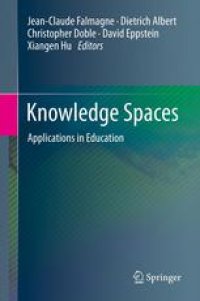
Ebook: Knowledge Spaces: Applications in Education
- Tags: Mathematical Models of Cognitive Processes and Neural Networks, Combinatorics, Probability Theory and Stochastic Processes, Educational Technology, Assessment Testing and Evaluation, Artificial Intelligence (incl. Robotics)
- Year: 2013
- Publisher: Springer-Verlag Berlin Heidelberg
- Edition: 1
- Language: English
- pdf
The book describes up-to-date applications and relevant theoretical results. These applications come from various places, but the most important one, numerically speaking, is the internet based educational system ALEKS. The ALEKS system is bilingual English-Spanish and covers all of mathematics, from third grade to the end of high school, and chemistry. It is also widely used in higher education because US students are often poorly prepared when they reach the university level. The chapter by Taagepera and Arasasingham deals with the application of knowledge spaces, independent of ALEKS, to the teaching of college chemistry. The four chapters by Albert and his collaborators strive to give cognitive interpretations to the combinatoric structures obtained and used by the ALEKS system. The contribution by Eppstein is technical and develops means of searching the knowledge structure efficiently.
The book describes up-to-date applications and relevant theoretical results. These applications come from various places, but the most important one, numerically speaking, is the internet based educational system ALEKS. The ALEKS system is bilingual English-Spanish and covers all of mathematics, from third grade to the end of high school, and chemistry. It is also widely used in higher education because US students are often poorly prepared when they reach the university level. The chapter by Taagepera and Arasasingham deals with the application of knowledge spaces, independent of ALEKS, to the teaching of college chemistry. The four chapters by Albert and his collaborators strive to give cognitive interpretations to the combinatoric structures obtained and used by the ALEKS system. The contribution by Eppstein is technical and develops means of searching the knowledge structure efficiently.
The book describes up-to-date applications and relevant theoretical results. These applications come from various places, but the most important one, numerically speaking, is the internet based educational system ALEKS. The ALEKS system is bilingual English-Spanish and covers all of mathematics, from third grade to the end of high school, and chemistry. It is also widely used in higher education because US students are often poorly prepared when they reach the university level. The chapter by Taagepera and Arasasingham deals with the application of knowledge spaces, independent of ALEKS, to the teaching of college chemistry. The four chapters by Albert and his collaborators strive to give cognitive interpretations to the combinatoric structures obtained and used by the ALEKS system. The contribution by Eppstein is technical and develops means of searching the knowledge structure efficiently.
Content:
Front Matter....Pages I-XII
Front Matter....Pages 1-1
Overview....Pages 3-26
Assessing Mathematical Knowledge in a Learning Space....Pages 27-50
ALEKS-based Placement at the University of Illinois....Pages 51-68
The Impact of a Mathematical Intelligent Tutoring System on Students’ Performance on Standardized High-Stake Tests....Pages 69-78
A Potential Technological Solution for Reducing the Achievement Gap Between White And Black Students....Pages 79-91
A Commercial Implementation of Knowledge Space Theory In College General Chemistry....Pages 93-113
Using Knowledge Space Theory to Assess Student Understanding of Chemistry....Pages 115-128
Front Matter....Pages 129-129
Learning Spaces: A Mathematical Compendium....Pages 131-145
Recent Developments in Performance-based Knowledge Space Theory....Pages 147-192
Heuristics for Generating and Validating Surmise Relations across, between and within Sets/Tests....Pages 193-227
Skills, Competencies and Knowledge Structures....Pages 229-242
Recent Developments in Competence-based Knowledge Space Theory....Pages 243-286
Learning Sequences: An Efficient Data Structure for Learning Spaces....Pages 287-304
Projection, Decomposition, and Adaption of Learning Spaces....Pages 305-322
Back Matter....Pages 323-354
The book describes up-to-date applications and relevant theoretical results. These applications come from various places, but the most important one, numerically speaking, is the internet based educational system ALEKS. The ALEKS system is bilingual English-Spanish and covers all of mathematics, from third grade to the end of high school, and chemistry. It is also widely used in higher education because US students are often poorly prepared when they reach the university level. The chapter by Taagepera and Arasasingham deals with the application of knowledge spaces, independent of ALEKS, to the teaching of college chemistry. The four chapters by Albert and his collaborators strive to give cognitive interpretations to the combinatoric structures obtained and used by the ALEKS system. The contribution by Eppstein is technical and develops means of searching the knowledge structure efficiently.
Content:
Front Matter....Pages I-XII
Front Matter....Pages 1-1
Overview....Pages 3-26
Assessing Mathematical Knowledge in a Learning Space....Pages 27-50
ALEKS-based Placement at the University of Illinois....Pages 51-68
The Impact of a Mathematical Intelligent Tutoring System on Students’ Performance on Standardized High-Stake Tests....Pages 69-78
A Potential Technological Solution for Reducing the Achievement Gap Between White And Black Students....Pages 79-91
A Commercial Implementation of Knowledge Space Theory In College General Chemistry....Pages 93-113
Using Knowledge Space Theory to Assess Student Understanding of Chemistry....Pages 115-128
Front Matter....Pages 129-129
Learning Spaces: A Mathematical Compendium....Pages 131-145
Recent Developments in Performance-based Knowledge Space Theory....Pages 147-192
Heuristics for Generating and Validating Surmise Relations across, between and within Sets/Tests....Pages 193-227
Skills, Competencies and Knowledge Structures....Pages 229-242
Recent Developments in Competence-based Knowledge Space Theory....Pages 243-286
Learning Sequences: An Efficient Data Structure for Learning Spaces....Pages 287-304
Projection, Decomposition, and Adaption of Learning Spaces....Pages 305-322
Back Matter....Pages 323-354
....